- Home
- Hugo Hamilton
The Sailor in the Wardrobe Page 2
The Sailor in the Wardrobe Read online
Page 2
Our family is a factory of remembering and forgetting. My mother’s diary is full of secrets and nightmares. There’s a drawing by my sister Maria of a wolf with green teeth preventing her from getting down to my mother at the bottom of the stairs. There’s a picture of my brother Franz in one window of the house and everybody else in separate windows of the same house, unable to speak to each other or hear each other calling, because each room has a different colour and a different language. There’s a picture of a river coming through the front door with lots of people that we don’t know on boats sailing along the hall, speaking English. There were nightmares in Irish and nightmares in German. Nightmares in English that could only be drawn without words. Family nightmares and world nightmares. I once drew the picture of a Jewish man who had his beard ripped off and his chin was all red, because my mother told me that story and I couldn’t stop thinking about it. There’s a drawing of Roger Casement being buried in Glasnevin. Another drawing of the Berlin wall and people trying to escape through the windows of their houses, throwing their suitcases and their children down first.
Sometimes we had to draw the nightmare and also the solution. Maria at the bottom of the stairs in my mother’s arms, and the wolf locked in the bathroom. My sister Bríd standing at the window getting lots of good blue air into her lungs instead of bad red air. Nightmares about my mother not being in the same country as us. At one time, my drawings were all full of pigs and chickens and farmers facing in one direction. All the smoke and all the flags were flying to the left until one night, when my mother discovered that she was the only person looking the other way, to the right. She told me to turn her around and then everything was fine, with all of us facing in the same direction, all in the same country again.
There were so many nightmares in our house that my mother must have been up all night sometimes. As soon as one bad thing was down on paper, something new would get into our heads. The more we drew our nightmares, the more we made up new ones. There are night drawings of skeletons, snakes, spiders, lions, walls with eyes, doors with teeth, stairs with massive earthquake cracks opening up on our way to bed. We used up every monster there was, my mother says, and there could hardly be any more nightmares left for us, but still we invented more. And downstairs at night, I know my father and mother were busy with their own nightmares. My father in the front room trying to write articles for the papers and thinking of new inventions that would make Ireland a better place. My mother in the kitchen at the back, putting her German secrets into her diary along with ours.
It was the nightmare factory. Other families were obsessed with sport, or music, or practising Irish dancing. We grew up dreaming about things that happened and things that had not happened yet and things we wished had never happened. By drawing everything down on paper, we developed a special talent for inventing fears and nightmares. We became the nightmare artists.
At some point we all started dreaming fire. A timber yard went up in flames in Dublin one night and you could see the firemen on ladders directing the water across the walls. An oil tanker on fire and the whole sea covered in flames. Trees on fire in Vietnam. Blazing cars in Northern Ireland. A man named Jan Palach set himself on fire on Wenceslas Square in Prague. My mother remembered seeing lots of things on fire with her own eyes in Germany during the war. She remembered the synagogue in Kempen on fire and no firemen helping to put it out. So then it was drawings of buildings on fire, prams on fire, a doll’s house on fire. Now it’s buses burning in Belfast and you think there’s almost no point in fixing anything down on paper any more, because it keeps coming back again and again on the TV every night, right in front of your eyes.
All over the world, there is trouble on the streets now and trouble inside the houses. Civil rights demonstrations. People marching with placards and throwing stones at the police. At dinner, my father slaps his hand on the table and says things are changing in Northern Ireland at last, things that were left unfinished for years. He points at the TV and says he can’t wait for the future when things will be just like they were in the old days before the British.
You can see them throwing stones and petrol bombs at the police. Everybody talking about a place called the Bogside in Derry where the police were firing tear gas at the people in the street and you saw the crowd of protesters, some of them like cowboys with handkerchiefs over their mouths and noses, picking up the gas canisters and throwing them back. My father says it must be against the Geneva convention to use CS gas on people in the street, where there could be children and old people nearby with bad chests and lung conditions. At the battle of the Bogside, you saw them throwing petrol bombs down from the roof of the flats. The people of Derry were winning because the women start factories of petrol bombs and there was an endless supply that kept raining down onto the police. You saw a policeman on fire, screaming and kicking the flames away off his legs. Other policemen coming to help him, beating the fire off with their shields. Eventually the police lost the battle and the British army was called in. My father said the picture was complete now with the four allies from the Second World War still doing the same thing, as if they could not get out of the habit. It was French troops in Algeria, Russian troops in Prague, American troops in Vietnam, and now the British troops in Northern Ireland. We heard Jack Lynch saying that we could no longer stand idly by and watch Irish people getting hurt again. I even made a petrol bomb myself one day, because I was working in a garage at the time. But then I had nothing much to throw it at, so I just lit it and watched the earth on fire in the lane at the back.
When the British soldiers first arrived in Belfast, the Catholic people thought it was a great liberation because at least they were no longer going to be ruled by their Protestant neighbours. We saw pictures of women on the streets, handing out cups of tea to the soldiers and saying they were welcome. But that didn’t last long and very soon, the British soldiers were despised even more than their neighbours. The same women who had given them tea were seen kneeling down in the streets, banging dustbin lids as the soldiers went by in Saracen jeeps. The army of occupation, they were called now, and you could hear the sound of dustbin lids echoing all over the city like a long shout, like the curse of history following them wherever they went through the streets. One day I came home and saw my mother banging the dustbin lid on the granite step in front of the house. I could hear it echo along the street and it looked like she was carrying out a solitary protest of her own. When I asked her if she was doing it against the British, she laughed out loud and kept repeating it all evening, because no such thing had ever even entered into her head and she was only banging the lid to try and knock the snails off.
And now the long shout was coming after Dan Turley. I heard it very clearly, as if it was right beside us, or above us. Just one shout, like an accusation that would not go away. Dan’s surname left hanging in the air all around us. I knew how threatening it was to hear your own name being shouted out like this by some invisible voice. Your own name like the worst insult in the world, following you down the street like a million banging dustbin lids.
We had struck a shoal and were pulling in the mackerel. Dozens of them, leaping into the boat as if they were surrendering. The boat was full of slapping as the fish jumped around inside the metal box. I once asked Dan what it was like for mackerel. Was it the same as drowning for us or was it more like getting drunk, suffocating with too much oxygen, like when you breathe in fast and get dizzy? But he said nothing. He never says much. He doesn’t even call me by name. He just mutters and sometimes you have to guess what he’s saying in his Northern accent. I know very little about him. I know he’s an old man, over seventy. But he doesn’t want conversations about where you’re from and what age you are and how a mackerel feels when he’s dying on the bottom of the boat, staring at people’s shoes up close. All he told me once was that mackerel never stop moving. They can’t stay still. They’re on the run all the time, travelling at thirty miles an hour underwater with
out stopping.
Dan ignored the shout and pretended it wasn’t his name. Maybe he had heard this kind of phantom shout many times before, but then he must have lost his concentration, because the line suddenly slipped out of his hand and ran out across the gunwale. He tried to catch it, but a hook buried itself deep, right in between thumb and forefinger.
‘Hook,’ he said through his teeth and I saw the blood in his hand.
Ever since I started working at the harbour, I have been dreaming about hooks in jaws. Hooks in eyes, hooks in every part of your body. Hook torture and hook crucifixion. Maybe I should have got up one night and drawn it down on paper so that it would go away, because now it was happening in front of my eyes.
He was helpless for a moment, staring down at his hand, gripping it with the other hand, trying to squeeze out the pain with his thumb and forefinger, as if it was the sound of his own name that hurt so much. The blood was already leaking into his palm, mixing in with the blood of mackerel and fish scales. Outside the boat, the mackerel were tugging at the line, swimming around in circles, trying to get away and digging the hook deeper. I knew what to do. I pulled in my line and threw it across the floor of the boat with the fish still on their hooks. There was no time to do the same with his, so I got the filleting knife and cut it. The remaining mackerel were released and swirled away on their hooks, shackled to each other for ever by this piece of lost line, swimming down and sideways as if they couldn’t agree where to go at all.
He examined his hand and started swivelling the hook around, forcing more blood out and making everything worse. Then he held his hand towards me. I didn’t trust myself and felt his hand shaking as I tried moving the hook around slowly like a surgeon to see if I could reverse it out without doing any more damage.
‘Pull the fucken’ thing,’ he growled.
I had to extract it quickly. Pretend it was another mackerel. I pulled as fast as I could, but it tore a hole and left a bit of loose flesh dangling. He took in a deep breath and narrowed his eyes. I let go of his hand and saw blood on my fingers. Then I dropped the hook on the floor of the boat with the soggy, brown cigarette butts, because we were already very close to the island, almost on top of the rocks, and there was no time to lose. I could see the ribbons of black seaweed waving and the shape of the rocks, like large, luminous green creatures swimming underneath, waiting for us. He moved aside so that I could start the engine as fast as possible. He sat holding his clenched hands, as if he was praying, with the blood running into the sleeve of his jacket. I turned the boat around and the engine scraped across the back of one of the rocks beneath us. It made an underwater groan, but I managed to steer away from danger and head towards the harbour.
On our way back, the sun disappeared behind a cloud, so I could see everything very clearly without holding my hand up over my eyes. The land came back into view, but there was nobody to be seen on top of the rocks. I looked at the fish on the bottom of the boat. Most of them were rigid by now, but one or two of them were brought back to life again as the boat bounced across the water, wriggling fiercely one last time before going quiet again. Dan reached his hand out over the side of the boat and washed it. He stared across the water behind us, dreaming with his eyes open. He didn’t want to talk about it and I knew he didn’t want me to tell anyone. When we got back to the harbour, he left me to tie up the boat and carry everything in, while he got out and walked away with his hands in the pockets of his jacket. He was not in a rush. He walked back across the pier and disappeared inside the shed as if nothing had happened.
The harbour is a place of nightmares, but it’s where I want to be. I love the sight of the wide open bay and the clouds, like big handwriting in the sky. I love the moon shining on the water at night, like a soft, powdery white light drifting across the world. I belong to the sea, like my grandfather, John Hamilton, the sailor with the soft eyes who got locked into the wardrobe by my father. I know he lost his life when he fell on board a British navy ship during the First World War. And after the Irish liberated their country from British rule, he disappeared, because my father wants Ireland to be fully Irish and thinks his own father betrayed his country. When we were small, we got trapped in the wardrobe along with the sailor once and had to be rescued. I am the same age now as my grandfather was when he joined the navy, so I’m stepping into his shoes. I work on the boats and go out fishing like his people did in Glandore, on the coast of West Cork. Sometimes I sneak upstairs to the wardrobe while my father is at work and look at the photograph of John Hamilton in his sailor’s tunic. I wonder if I look like him. I want to be a sailor and travel all over the world like he did before he died. I’m going to become my own grandfather. I’m going to take his name and help him to escape out of the wardrobe.
Three
On my way home from the harbour, I see people going swimming with towels rolled up under their arms. The tide is in and I see them changing, leaving their clothes in bundles on the blue benches. Girls doing the Houdini trick behind their big towels and coming out in their swimsuits. I stop for a moment to watch them jumping off the rocks, yelping and splashing as they go in. They swim around to the steps and come up all wet and skinny, then do the whole thing all over again. Girls ganging up on the boys and them all going in together. One of the boys on the diving board pretending to die with a guitar in his hands, singing ‘I’ve got that loving feeling’ as he falls backwards with a big splash. I know that as you go into the water like this, there is a moment when you stop moving altogether and just hang in the same spot underwater without breathing, surrounded by silence and air bubbles before you begin to move back up towards the surface. You feel no gravity. You become weightless.
After dinner every evening, my father is sawing and hammering. This time he’s building a big music centre. I’ve seen the plans, with separate sections for the turntable and the amplifier, and lots of compartments to store the records in. He discovered the whole thing in a German phonographic magazine which claims that you can have a live orchestra in your own front room any time you like. It’s taking a long time to build and even longer for all the parts to arrive in from Sweden and Germany. The speaker frame is already finished and standing in the front room – a giant, triangular-shaped wooden box about five feet high, taking over an entire corner to itself. It’s been constructed with cavity walls filled with sand to stop any distortion in the sound. He has been drying the sand out in small glass jars for weeks, placing them in the oven for an hour at a time and then pouring them into the wall around the speaker. There’s even a small shutter at the bottom to let in the air.
Now he’s begun to work on the cabinet itself. He’s got a pencil stub balancing on the top of his ear as he explains to us how each panel has to be dovetailed and fitted together, how each compartment has to have its own door on piano hinges with its own little lock and key. All the wires connecting up the turntable and the amplifier at the back will be hidden. Very soon, the system will be up and running, and my mother says we’ll be able to hear them turning the pages in the orchestra. But then he’s looking at the plans again, turning the sheets upside down and wondering why one part of the unit refuses to fit. He says he should have marked every section with a little arrow or a number. My mother reads over the instructions once more and he holds pieces of wood in his hands, sticking his tongue out the side of his mouth. Everybody in the house has to be quiet and not make things worse, but then it comes, at the worst possible moment, a word in the English language, the foreign language, the forbidden language.
‘Help.’
It’s my sister Maria, trapped under the stairs. When you open the in-between door in our house while somebody is in the pantry under the stairs, they won’t be able to get out. We used to take prisoners and lock each other in. Now and again it happens to my mother and she laughs because it’s like spending time in jail with only tins of peas and jars of jam all around you. This time it’s Maria accidentally locked in, but my father drops all the wood and c
omes storming out because he thinks it’s my fault.
‘What have you done?’ he shouts.
‘Nothing.’
The instant denial. My mother says it’s always the perpetrators who claim they were just minding their own business. You don’t deny something you didn’t do. But why should I feel guilty? I’m secretly thrilled to be accused in the wrong and stand there smiling until my father rushes forward to hit me on the side of my face. It comes so fast that I lose my balance. My hand goes up to my ear and I see the look of anger in his eyes. Sadness, too, as if he can’t help lashing out, as if it’s not really him at all, but the countless lashes he got himself that have suddenly compelled him into this summary punishment in the hallway. All the punishment in history passed on, lash by lash.
‘Go to your room,’ he shouts.
My mother tries to stop him, but it’s too late and I’m already walking up the stairs with heavy feet, turning around to give him a last look of poisoned glory. It’s a miscarriage of justice. You have punished the innocent. And then to confirm it, Maria comes running up the hallway.
‘He didn’t do it.’
‘It’s a mistake,’ Franz echoes behind her.

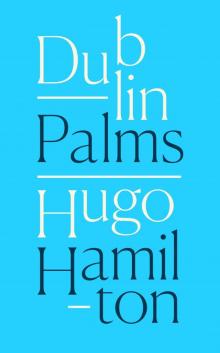 Dublin Palms
Dublin Palms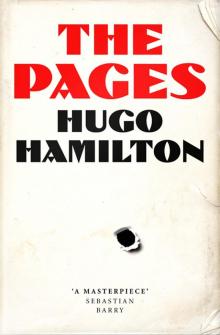 The Pages
The Pages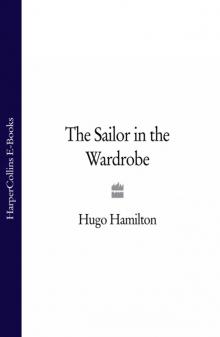 The Sailor in the Wardrobe
The Sailor in the Wardrobe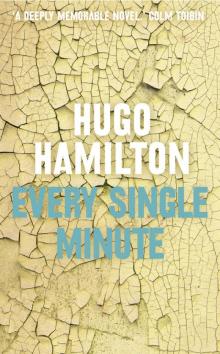 Every Single Minute
Every Single Minute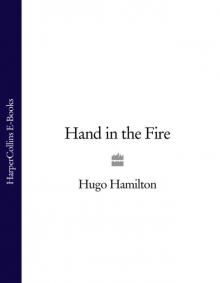 Hand in the Fire
Hand in the Fire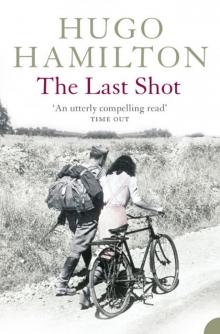 The Last Shot
The Last Shot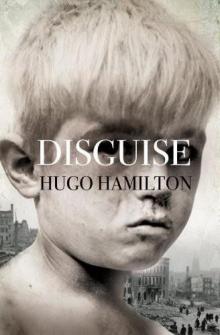 Disguise
Disguise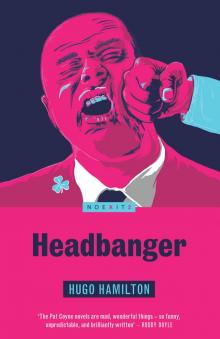 Headbanger
Headbanger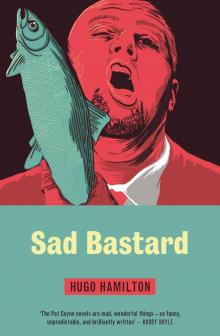 Sad Bastard
Sad Bastard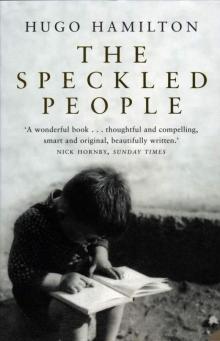 The Speckled People
The Speckled People